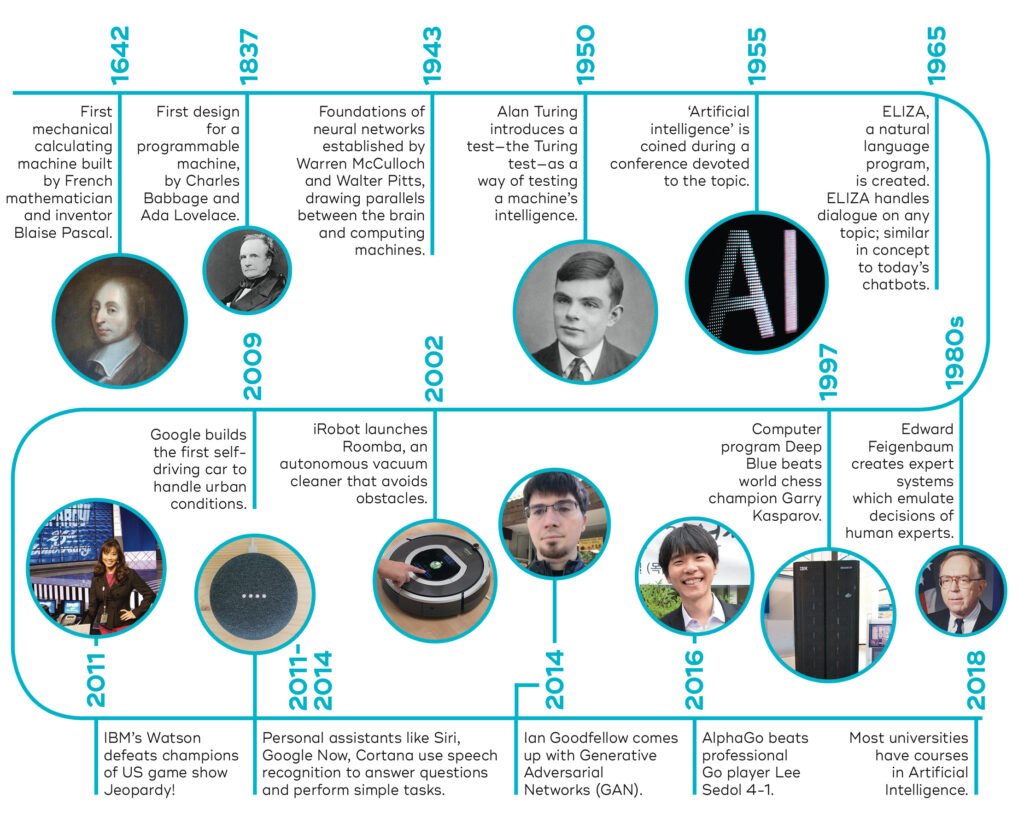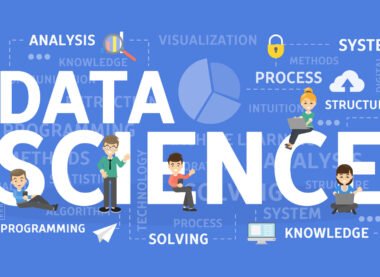What is artificial intelligence, and why is it such a buzzword in today’s tech landscape? Artificial intelligence, or AI, refers to the simulation of human intelligence in machines that are programmed to think and learn like humans. The concept might seem futuristic, but AI is already all around us, from the smartphones in our pockets to the algorithms that dictate what we see on social media. This blog will explore the nuances of artificial intelligence technology, its various applications, and the lucrative career opportunities it offers, including the potential salaries that come with different AI roles.
Understanding Artificial Intelligence
Artificial intelligence encompasses a range of technologies that enable machines to sense, comprehend, act, and learn with human-like levels of intelligence. Maybe that’s why AI seems so intriguing and mysterious. But at its core, AI is about creating systems that can function intelligently and independently.
Brief History of AI

The journey of AI began in the mid-20th century, fueled by the theoretical and practical work of pioneers like Alan Turing and John McCarthy. Turing, often called the father of theoretical computer science and artificial intelligence, proposed what is now known as the Turing Test, a criterion of intelligence that is based on a machine’s ability to exhibit intelligent behavior equivalent to or indistinguishable from that of a human.
Core Technologies Underpinning AI
- Machine Learning: This is the backbone of AI, where algorithms use statistical methods to improve over time. For example, machine learning models are used in Netflix’s recommendation system to suggest movies and shows based on your viewing history.
- Neural Networks: Inspired by the human brain, these systems learn tasks by considering examples, generally without task-specific programming. For instance, Google’s search algorithms now use neural networks to better understand user queries.
The exploration of artificial intelligence reveals a landscape rich with potential. From enhancing everyday tasks with automation to driving the next generation of technological innovation, AI’s role in our lives is undeniable and growing rapidly. Next, we’ll delve into its applications across various industries, highlighting how this technology is not just about futuristic robots but real-world efficiency and problem-solving.
Applications of Artificial Intelligence
Artificial intelligence technology isn’t just a scientific marvel; it’s a transformative force across multiple sectors. Let’s explore some of the most compelling applications of AI across various industries:
Healthcare
In the healthcare sector, AI is revolutionizing patient care and administrative processes. For instance, AI-powered diagnostic tools can analyze images, genetic information, and other data to predict diseases early and with impressive accuracy. An example of this is IBM Watson’s ability to use cognitive technology to process and analyze huge amounts of medical data at speeds and accuracies that humans can’t match.
Finance
AI in finance is changing how we interact with money. AI systems can personalize financial advice, manage portfolios, and optimize savings strategies. They also play a critical role in fraud detection, using pattern recognition to identify suspicious transactions almost instantly, which human analysts might take hours to recognize.
Automotive Industry
The automotive industry is harnessing AI to push the boundaries of innovation, particularly in the development of self-driving cars. AI algorithms process data from vehicle sensors and external sources to make split-second decisions that can help avoid accidents and improve traffic flow. An example here is Tesla’s Autopilot system, which uses AI to enable vehicles to steer, accelerate, and brake automatically under certain conditions.
These examples show that AI’s application extends beyond theory into practical, real-world uses that can improve efficiency, safety, and outcomes across various aspects of life.
Career Opportunities in Artificial Intelligence
AI Research Scientist
AI research scientists are at the forefront of AI advancements, developing new methods for machine learning and neural network design. These professionals require a deep understanding of AI, including its theoretical and technical aspects.
Machine Learning Engineer
Machine learning engineers are vital in making AI models come to life. They apply predictive models and use natural language processing while working closely with data scientists to analyze and use data efficiently.
Data Scientist
Data scientists collect, analyze, and interpret large, complex datasets using both machine learning and predictive analytics to glean insights that inform AI applications. They often work in teams to create models that can predict trends or behaviors.
AI Software Developer
Developers specializing in AI are tasked with designing, programming, and testing applications for AI systems. Their work often overlaps with that of machine learning engineers but focuses more on software development.
Salaries in Artificial Intelligence
Salaries in the AI field are highly competitive, reflecting the high demand for these skills. For instance:
| Job Title | Salary Range in GBP |
|---|---|
| AI Research Scientist | £105,000 – £135,000 |
| Machine Learning Engineer | £81,000 – £121,500 |
| Data Scientist | £32,850 – £82,500 |
Preparing for a Career in AI
Educational Pathways
Most careers in AI require at least a bachelor’s degree in computer science, artificial intelligence, or related fields. Advanced positions may require a master’s degree or Ph.D. Top universities offering specialized AI programs include Stanford University, MIT, and Carnegie Mellon University, known for their rigorous coursework in machine learning, robotics, and cognitive computing.
Key Certifications and Courses
Certifications can boost your employability in this competitive field. Consider the following:
- Professional Certificate in Machine Learning and Artificial Intelligence from edX, designed by experts at MIT.
- IBM AI Engineering Professional Certificate on Coursera, which covers machine learning, neural networks, and deep learning.
Tips for Aspiring AI Professionals
- Stay Updated: The field of artificial intelligence is continually evolving, so staying updated with the latest research, tools, and technologies is crucial.
- Practical Experience: Hands-on experience through internships or personal projects in AI can significantly enhance your understanding and skills.
- Networking: Join AI forums, attend conferences, or participate in hackathons to connect with other AI professionals and learn from their experiences.
Wrapping Up: The Future of AI and You
Artificial intelligence isn’t just a specialty area within technology anymore; it’s a dynamic field that spans multiple sectors and offers myriad opportunities for growth. Whether it’s enhancing the precision of medical diagnostics, improving customer service interfaces, or driving the future of autonomous vehicles, AI’s potential is vast and expanding.
The journey into AI is challenging but rewarding, with competitive salaries to match the high demand for expertise. As industries continue to adopt AI technologies, the opportunities for AI professionals will only grow, making now an excellent time to start preparing for a future in this exciting field.

At the Centre of Excellence, we provide a comprehensive Artificial intelligence course designed to propel you into a successful career in AI. Our program not only equips you with cutting-edge knowledge and practical skills but also offers a 100% job guarantee upon completion. Start your journey towards becoming an AI expert with us and secure your future in this dynamic field.
FAQs
What is artificial intelligence (AI)? Artificial intelligence involves the development of computer systems that can perform tasks typically requiring human intelligence, such as visual perception, speech recognition, decision-making, and language translation.
What does artificial intelligence technology entail? Artificial intelligence technology encompasses a variety of technologies including machine learning, neural networks, deep learning, and cognitive computing, all aimed at enabling machines to learn from experiences and perform human-like tasks.
How can I start a career in artificial intelligence? To begin a career in AI, focus on acquiring strong foundational knowledge in mathematics, programming, and statistics. Consider pursuing specialized courses or degrees in artificial intelligence and gaining hands-on experience through internships or projects.
Where can I get a job with a 100% guarantee after studying AI? The Centre of Excellence provides a comprehensive artificial intelligence course with a 100% job guarantee upon completion, preparing graduates for immediate employment in the AI field.
What is the meaning of artificial intelligence in everyday life? In everyday life, artificial intelligence meaning translates to applications like personalized recommendations on streaming services, voice assistants on smartphones, and automated customer service chatbots.
What are the top careers in artificial intelligence and their potential salaries? Top AI careers include AI Research Scientists, Machine Learning Engineers, and Data Scientists. Salaries vary based on location and experience, typically ranging from £68,850 to £137,700 in the UK.
How does artificial intelligence impact industries like healthcare and finance? In healthcare, AI is used for tasks such as predictive diagnostics and personalized medicine. In finance, AI technologies streamline operations, enhance customer service, and improve fraud detection, significantly impacting efficiency and security.



